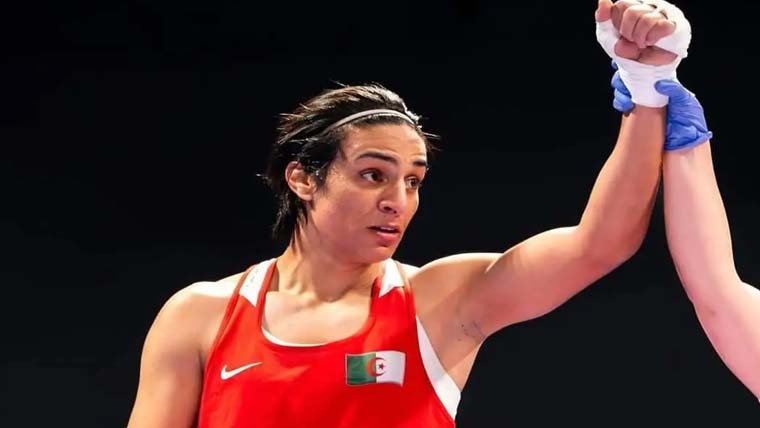
Paris, France – Iman Khalifa, the Algerian boxer who made headlines for winning a gold medal in women’s boxing at the 2024 Paris Olympics, is once again at the center of a controversy that is raising questions about gender identity, eligibility, and fairness in competitive sports. The latest twist in this saga comes with the leak of a medical report that allegedly reveals Khalifa’s true gender, suggesting that she may not be a woman, but a man. This revelation has sparked intense debates on social media and among sports enthusiasts, with many now calling for the gold medal to be revoked.
The Medical Report Leak: A Turning Point in the Controversy
The controversy surrounding Iman Khalifa began before the Paris Olympics, with many observers raising questions about her physical characteristics. Despite Khalifa identifying as a woman and competing in the women’s boxing events, her muscular build, facial features, and overall physique led to widespread speculation about her gender. Throughout the competition, Khalifa found herself the subject of constant media scrutiny, with some questioning whether her body conformed to the biological criteria required for competing in women’s sports.
This issue escalated further when a medical report, allegedly compiled by both French and Algerian medical experts, was leaked. The report, which was supposedly prepared in 2023 and later leaked to international media, revealed that Iman Khalifa may possess male physical traits. While the authenticity of the report has yet to be confirmed, the claims it makes have created a storm of debate.
According to the leaked report, Khalifa exhibits several male characteristics, which could disqualify her from competing in the women’s category under existing regulations governing gender in sports. The report, prepared by medical professionals in hospitals both in Paris and Algeria, purportedly indicates that Khalifa has higher levels of testosterone than are typically found in women, and other male physical traits, such as muscle mass and bone structure, that could be seen as an advantage in the boxing ring.
Public Backlash: Demands to Revoke the Gold Medal
The leak of the medical report has ignited a flurry of responses on social media, with many calling for Khalifa’s Olympic gold medal to be rescinded. Critics argue that if Khalifa is, in fact, biologically male or possesses male characteristics, her participation in the women’s boxing event constitutes an unfair advantage and violates the principles of fairness in sports.
Social media platforms have been flooded with users demanding that the International Olympic Committee (IOC) launch a full investigation into Khalifa’s eligibility to compete in the women’s category. Some are calling for a review of her past performances and medical records, while others are advocating for her medal to be stripped if the allegations are substantiated. The calls to take action are gaining momentum, with many athletes, sports analysts, and commentators joining the conversation, some expressing concerns about how gender identity is being defined and handled in the world of sports.
One of the central issues raised by critics is whether Khalifa’s physical characteristics give her an advantage in a highly competitive sport like boxing, where strength, muscle mass, and physical endurance are key factors in success. The question of fairness and ensuring a level playing field for all athletes, regardless of gender, has become a central topic of the debate.
Iman Khalifa’s Journey to the Gold Medal
Despite the growing controversy, it is important to acknowledge Khalifa’s extraordinary achievement in the 2024 Paris Olympics. The gold medal she won in women’s boxing was a milestone not just for her but for Algeria as well, adding to the country’s prestige in the international sports community. Khalifa had trained for years, enduring countless hours of practice, and overcoming various challenges to reach the highest level of boxing.
During the competition, Khalifa’s performance was remarkable. She demonstrated skill, technique, and mental fortitude that earned her a place at the top of the podium. Her victory was celebrated by many fans, particularly in Algeria, where she was hailed as a hero. However, her success was overshadowed by ongoing discussions about her physical appearance and the questions surrounding her gender. Despite her victories, it seems that Khalifa’s physical traits, which set her apart from other female competitors, became a point of contention rather than a celebration of her talent and hard work.
Gender and Sports: A Complex and Controversial Issue
The controversy surrounding Iman Khalifa is part of a broader and increasingly contentious debate about gender and eligibility in sports. As athletes like Khalifa continue to challenge traditional notions of gender, the question of how to define and regulate gender in competitive sports has become a difficult issue for governing bodies to address.
The International Olympic Committee (IOC) and other sports organizations have long struggled with how to establish fair and consistent policies regarding the participation of transgender and intersex athletes. The existing rules allow athletes to compete in categories that align with their gender identity, but these rules are not universally accepted or applied. Many believe that the current system does not adequately address the complexities of gender and may lead to unfair advantages for certain athletes, while others argue that the focus should be on inclusivity and equal opportunity for all athletes, regardless of their biological sex.
Khalifa’s case underscores the challenges that arise when athletes, such as those with ambiguous gender characteristics, enter traditional gender-based competitions. It raises difficult questions about how to ensure fairness while also protecting the rights of athletes to compete as they identify. Furthermore, the debate around Khalifa is not just about one individual but rather reflects a larger conversation about how sports organizations can manage issues of gender in a rapidly changing world.
The Road Ahead: What Happens Next?
As the controversy surrounding Iman Khalifa continues to unfold, the IOC and other relevant governing bodies will likely have to intervene and issue statements regarding her eligibility. It is unclear what action, if any, will be taken in light of the leaked medical report. However, the situation highlights the complexity of gender issues in sports and the challenges governing bodies face in keeping up with evolving understandings of gender identity and fairness.
At the same time, Iman Khalifa’s supporters have pointed out that her victory should be recognized for the skill and determination she demonstrated in the ring, regardless of her physical traits. They argue that instead of focusing on her gender, the discussion should center on her abilities as an athlete and the remarkable accomplishment of winning an Olympic gold medal.
Ultimately, the Iman Khalifa controversy raises more questions than it answers. What is clear is that the conversation around gender and sports is far from over. Whether Khalifa retains her gold medal or whether the rules governing gender in competitive sports are revised, her case has sparked an important debate that will continue to evolve in the years to come.
For now, the world watches as this controversy plays out, with implications not just for Khalifa, but for how gender will be defined and regulated in the future of sports.




